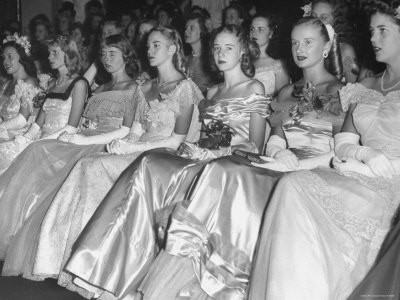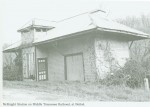The Society Book Club
The Society Book Club, the oldest book club in Watervalley, met this past week in the home of Marvelle Simpkins. It’s a big deal to Marvelle, being a member of the Society Book Club, especially since she is the youngest member at fifty-two. Most of the old high-brow gals are well into their seventies. Membership is limited to twelve with each member taking a particular month to give a book report and an alternate month to host the luncheon. The only way a slot comes open is either through death or imprisonment, both of which have occurred.
The original club formed in 1919 was originally called the High Society Book Club, a name given to it jokingly by the husbands of the original members. The Watervalley Railroad was in its heyday during those years and the upper crust boys all hung out at a private lodge called the Hunt Club, a stuffy collection of opulent, mahogany walled rooms filling
 out the top floor the old Farmers Bank building. It was here that the gilded boys would gather for whisky, cigars, and the ripe talk of politics. Their wives had started a book club under the auspices of reading and discussing the classics. Ironically, sequestered in the confines of their smoky rooms and oriental rugs, the Hunt Club boys thought this as rather snooty, and thus they jovially dubbed their wives little group as “The High Society Book Club.”
out the top floor the old Farmers Bank building. It was here that the gilded boys would gather for whisky, cigars, and the ripe talk of politics. Their wives had started a book club under the auspices of reading and discussing the classics. Ironically, sequestered in the confines of their smoky rooms and oriental rugs, the Hunt Club boys thought this as rather snooty, and thus they jovially dubbed their wives little group as “The High Society Book Club.”
Little did they know that the monthly gathering was more “Secret Society” than “High Society.” The intent of the original book club members was to discuss and promote Women’s Suffrage, something that their husbands would unanimously peg as a silly notion and would have vehemently protested.
The idea of supporting Women’s Suffrage had been brewing for several years in the thoughts of Hopewell Carter, (the wife of the Farmers Bank President, Chas Carter III) since November of 1914. She had been to Nashville to visit her freethinking, cigarette smoking, single sister Alice who taught art history at Peabody College. Alice drug Hopewell along to a speech given at the Hermitage Hotel by Anna Howard Shaw, the President of the National American Women’s Suffrage Association. It was their national convention.
By January of 1919 the idea had festered long enough, and Hopewell sought out some like minded friends to work covertly under the guise of the book club to write letters, send money, and lobby for passage of the 19th Amendment by the Tennessee Legislature. Filtering support through her sister, their efforts finally paid off when in August of 1920, after a hard fought battle, Tennessee became the 36th state to ratify the 19th Amendment. Tennessee was the lynch pin. Had it gone the other way, women’s suffrage would have been defeated nationally. The Hunt Club boys were never the wiser. Hopewell, along with her triumphant and clandestine cohorts continued on with the club, which eventually dropped the “High” from the title.
The real truth about the origin of the club came out years later in the 1940’s when most of the husbands were either too old or too dead to care. But also by then fortunes had changed, and many of the original members held on to their spots as a last vestige of social standing. Thus, a whole mythology of exclusivity was spawned regarding the Society Book Club. Membership rights were even passed on to daughters.
That’s why Marvelle thought it was a big deal.
She and her husband Randy had moved to Watervalley eleven years ago and breaking in to the community circles was harder than Marvelle had imagined. Since Randy had been brought there as Director of the Farmer’s Co-op, Marvelle thought that their place on the social register was assured. But the Watervalley elite turned out to be a bunch of damnable Rothchilds when it came to embracing outsiders. It didn’t help matters that Randy insisted on remaining a Baptist and adamantly refused to go to the Episcopal or Presbyterian Church where, as everyone knows, all the socially well heeled attended.
Marvelle’s daughter Alisha was home from college for an early spring break and was forced into servitude to help pull off the luncheon smoothly. She couldn’t wait to return to Belmont and her apartment in Hillsboro Village, to hang out with her friends at Bongo Java and discuss the real issues facing the world. But she was stuck here in the Watervalley backwater, obediently helping her mom serve cucumber sandwiches to an oddball collection of old women with hearing aids.
Even the way her mother referred to it was irritating. It was never just the book club. It was “The Society Book Club, the oldest book club in Watervalley” as if the descriptor was a permanent part of the club name. As a small act of rebellion she refused to wear a dress as requested by her mother. Thus she helped with the serving wearing her shorts and flip-flops. After the luncheon she hovered in the kitchen to do the dishes while the meeting and book presentation began in the adjacent living room.
Francis Shropshire gave a short presentation and summary of the chosen book of the month, Of Human Bondage by Somerset Maugham. Although Francis was in her seventies, her gravelly, deep, foghorn voice damn near made the shutters rattle. Even yet it still wasn’t enough to keep Polly Wilkins, the oldest member at eighty-four, from falling asleep as usual. In the adjoining kitchen, Alisha heard every word, occasionally rolling her eyes at the naivety of the ensuing discussion about poor Mr. Carey. “This is all so lame,” she thought. “They just don’t get the deeper issues, much less even mention that Maugham was gay.”
But what was really bothering her was her mother.
It just embarrassed her to no end that her mother kowtowed to this stuffy bunch of confused old women; that she went to such great lengths to impress them, as if anybody in Watervalley was worth impressing. She finished loading the dishwasher, then folded her arms and leaned against the kitchen counter, exhaling a deep sigh. But what she heard next almost made her heart stop.
The presentation was over and as was normal, what followed was the discussion was about choosing the next book. It was her mother talking, and in her clear, lilting voice she made a recommendation to the group about a book she had heard was very popular called Fifty Shades of Grey. Alisha stiffened up and tuned in sharply.
Camilla Tindale, probably the haughtiest member of the group, spoke first in her slow austere drag. “Oh heavens Marvelle, ….. shurley we’re not at the point of reviewing some decorating book.”
“Oh I don’t think it’s about decorating at all,” replied Marvelle.
Tiny Loftin, with her stingy pinched face, and bird like movements quickly added. “Is this that autobiography of Miss Clairol?”
This brought a round of snickers from the group along with a rise of muffled comments. Marvelle tried to regain order. “I think it’s more of a love story. I heard it has sold over thirty million copies.”
“And where did you hear that from?” Bellowed Francis in her barking voice.
“Well I was looking for bestsellers so I Googled it,” replied Marvelle.
“What’s a google?” Injected Polly Wilkins, now awake from her nap.
From the kitchen Alisha couldn’t believe her ears. Fifty Shades of Grey had been the underground rage at college. She had read it, discretely pouring over it on her e-reader while tucked away in the privacy of her apartment bedroom. The raw lascivious language, the bondage, the explicit sado-masochistic scenes, it was nothing these little old women could imagine. And now here was her mother; her unwitting, Baptist mother, blindly recommending it to the Society Book Club. If it were known that these women were reading this book it would be a scandal and her mother would be a laughingstock. She had to stop this.
Alisha barged into the living room with the coffee pot, asking if anyone needed refills. The discussion was continuing, with her mother beginning to win the day. Alisha went to the back of the room, behind all the women and was desperately trying to get her mother’s attention, shaking her head, mouthing the word “No,” and slicing her hand across her neck as a sign of “stop.”
But none of it worked. Her mother only gave her a confused look. Everyone was either nodding in agreement with her mother or nodding off altogether. They were getting ready to vote.
Alisha blurted out. “My friend didn’t like it!”
“Excuse me dear?” implored her mother with a face that was frantically trying to suppress the outrage she was feeling.
“That book, Fifty Shades of Grey, a friend of mine who is an English major, she didn’t like it.”
Her mother, now endeavoring to be diplomatic to her intrusive daughter, spoke in a detached, clipped voice. “Oh. I see. So. And what was it she didn’t like about it?”
“Well. I’m not sure. But, she really didn’t like it. I think it had too much, …… well, too much sex in it.”
With this comment there was a spontaneous elevation in posture of all present. The parliament of owls now perched attentively to the conversation.
Camilla Tindale spoke in pronouncement fashion. “Oh heavens dear, shurley you realize we’re not all prudes here. We’ve all read Lady Chatterley’s Lover for heavens sake.”
“Yes, I understand. But this book is different. It’s got a lot of well, bondage in it.”
“Did she say blondage?” Inquired Polly Wilkins, her hearing aid still not well adjusted. “Are we sure this isn’t that Miss Clairol book?”
Tiny Loftin responded pertly. “No Polly, she said bondage, whatever that is.”
Francis Shropshire joined the fray, laughing through her raspy voice. “Can’t see what the big deal is. Didn’t we just read Of Human Bondage?” That was about bondage, wasn’t it?”
Alisha was panicked, fervently trying to choose her words carefully. “Well, in this book it’s different, it’s just very, very different.” She glanced back at her mother. Then she sheepishly added. “At least, that’s what my friend told me.”
Marvelle couldn’t understand her daughter’s insistence. She spoke in an inquisitive, quietly pleading voice. “Alisha dear, Francis is right. I don’t see what is the issue here.”
From across the room, Alisha looked at her mother with beseeching desperation, thinking to herself, “Please, please, do not do this.” She mouthed the words silently to her. “Mother, please no.”
And that’s when it happened. Marvelle read something in her daughters face. It was something she had not seen before. This wasn’t the indifferent daughter of nineteen who would come home from college bored and indifferent with everything Watervalley. This was a different one. It was the first glimpse of a daughter to be, a daughter of years to come, a daughter of insight, compassion, protection.
Slowly, Marvelle nodded her head, took a deep breath, and surveyed the room. She spoke authoritatively. “Ladies, I think I’ll defer to my daughter’s judgment on this matter. I’ll come up with some different suggestions and get back with you.”
At first there was a general silence in the room, with the staunch old birds looking around with faces of stunned puzzlement. But Marvelle responded again with graceful firmness. “Thank you all so much for coming. It’s really been lovely.”
One by one the ladies began to rise and methodically shuffle towards coats and purses and the door. Chatter began in low notes but quickly crescendoed to the usual hubbub of salutations, pleasantries, and accommodating laughter. And as always, two or three lingered for another twenty minutes, saying goodbyes in the hallway, then on the porch steps, and then again out around the cars.
Marvelle made no inquiries to Alisha after everyone departed. Everything had been said between mother and daughter with the few knowing looks of the last thirty minutes. As the final dishes were cleared away, the air between them was light, and tender, and affectionate. They talked of maybe taking a trip to Nashville to do some shopping, just a fun, mother/daughter day trip.
To her relief, Alisha had to make no explanations to her mother about the book, and she discreetly took it off her e-reader later that day in the seclusion of her bedroom. As she did so, she reflected on the day, and thought it funny that more than one of the little old ladies had asked her the name of it on the way out the door.
The next afternoon, Mayfield Morrow of Morrow’s Drugs drove home feeling pretty good about himself. He knew that putting up that kiosk of electronic e-readers had been a good idea. It had sat there without a single sale for four months and then in one day he had sold seven of them. He might be seventy-two, but he still knew how to merchandise. He decided that tomorrow he would order twenty more.
I’m J. High, and for now in Watervalley, that’s pretty much the highpoint.










